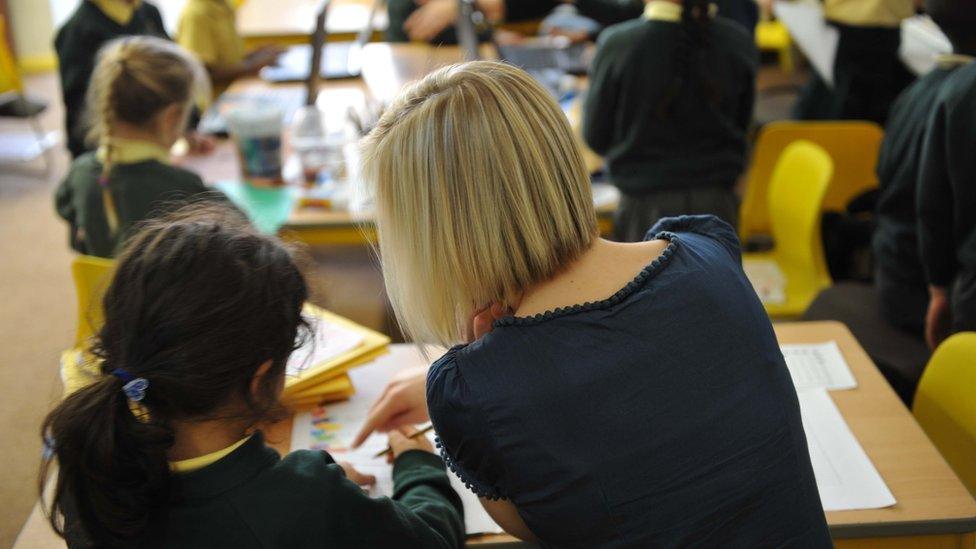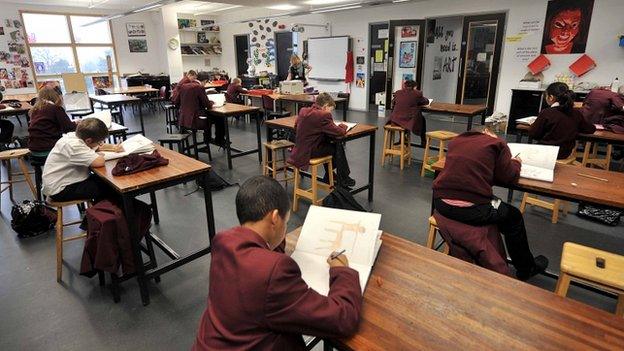'National crisis' looming in teaching, unions warn
- Published

Teachers ' pay is failing to keep pace with comparable professions warns the statement
A "national crisis" in teacher numbers is looming, six unions representing teachers and school leaders in England and Wales have warned.
Government limits to teachers' pay and "real terms cuts" to school budgets risk undermining standards, they warn.
"Teachers need a pay rise," they urge, in a joint statement to the School Teachers' Review Body (STRB), which sets their pay.
The government said it was attracting "the best and brightest" to teaching.
Teachers' pay increases have been limited to 1% or less for the past five years, and the government aims to keep to this limit for the next four years.

The teaching challenge by Hannah Richardson
With long, hard working hours and a relatively low starting salary for a graduate, it is hardly surprising that teacher recruitment is struggling.
Qualified teachers in England can expect to start on £22,000 outside London or £27,000 in inner London.
In most cases, this is after post-graduate training, a year's school placement and a degree course.
And although there is room for growth and progression - based on performance of course - many newly-qualified teachers find the pressures of the job too much and leave soon after taking their first post.
Teachers in England have some of the longest hours and largest classes in the developed world, says the Organisation for Economic Co-operation and Development.
Teaching unions have complained that although their staff were promised a 1% pay rise, this has had to be found from within existing school budgets.
Head teachers say school budgets are already at breaking point as they struggle to deal with other inflationary pressures.
But the DfE maintains new trainees can benefit from financial support, a good salary, enviable job security and a generous pension.

In October, England's education secretary, Nicky Morgan, wrote to the STRB, external to remind them of this policy.
'False economy'
But the joint statement warns that "as pay and prospects improve in comparable occupations", further pressure will be placed on teacher recruitment and retention.
This means more children will be taught by teachers who are not specialist in the subjects they teach, it adds.
With budgets "at breaking point", schools will struggle to maintain current spending - "let alone afford pay increases", it continues.
"The government must fully fund the necessary pay increases for teachers and school leaders in both England and Wales."
The six unions are:
The National Union of Teachers
The Association of Teachers and Lecturers
The National Association of Head Teachers
The Association of School and College Leaders
UCAC, representing teachers in Wales
Voice
Brian Lightman, general secretary of the Association of School and College Leaders, described four more years of pay austerity as a "false economy".

More pupils could be taught by teachers not specialist in the subjects they are teaching, warn the unions
Kevin Courtney, deputy general secretary of the National Union of Teachers, said teachers "are already leaving in droves and new graduates looking elsewhere for a career".
Mary Bousted, general secretary of the Association of Teachers and Lecturers, claimed 160,000 more teachers would be needed over three years to cope with a rapid increase in pupil numbers.
But she warned unless the picture improved the government would have little chance of meeting this target.
"Schools will have to start increasing class sizes or shutting courses and cutting the subject options available to pupils".
And Elaine Edwards, UCAC's general secretary urged the government to reconsider its pay policies "for the sake of our children and young people and the education system as a whole".
The STRB is expected to make its recommendations on teachers' pay in April.
A Department for Education spokeswoman said it had worked with the profession to "raise the status of teaching", adding that that a record number of highly-qualified graduates and "experienced career changers" were now teaching.
She added: "But we are determined to go further, and recognise that some schools find it harder to recruit the teachers they need, which is why we are expanding the great Teach First and Schools Direct programmes and we are launching the National Teaching Service, which will mean more great teachers in schools in every corner of the country."
- Published24 November 2015

- Published19 November 2015
